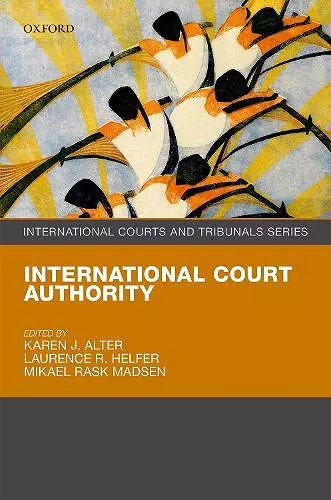International Court Authority
Mikael Rask Madsen author Laurence R Helfer editor Karen J Alter editor
Format:Paperback
Publisher:Oxford University Press
Published:17th Jul '18
Currently unavailable, and unfortunately no date known when it will be back
This paperback is available in another edition too:
- Hardback£125.00(9780198795582)

An innovative, interdisciplinary and far-reaching examination of the actual reality of international courts, International Court Authority challenges fundamental preconceptions about when, why, and how international courts become important and authoritative actors in national, regional, and international politics. A stellar group of scholars investigate the challenges that international courts face in transforming the formal legal authority conferred by states into an actual authority in fact that is respected by potential litigants, national actors, legal communities, and publics. Alter, Helfer, and Madsen provide a novel framework for conceptualizing international court authority that focuses on the reactions and practices of these key audiences. Eighteen scholars from the disciplines of law, political science and sociology apply this framework to study thirteen international courts operating in Africa, Latin America, and Europe, as well as on a global level. Together the contributors document and explore important and interesting variations in whether the audiences that interact with international courts around the world embrace or reject the rulings of these judicial institutions. Alter, Helfer, and Madsen's authority framework recognizes that international judges can and often do everything they 'should' do to ensure that their rulings possess the gravitas and stature that national courts enjoy. Yet even when imbued with these characteristics, the parties to the dispute, potential future litigants, and the broader set of actors that monitor and respond to the court's activities may fail to acknowledge the rulings as binding or take meaningful steps to modify their behaviour in response to them. For both specific judicial institutions, and more generally, the book documents and explains why most international courts possess de facto authority that is partial, variable, and highly dependent on a range of different audiences and contexts - and thus is highly fragile. An introduction situates the book's unique approach to conceptualizing international court authority within theoretical debates about the authority of global institutions. International Court Authority also includes critical reflections on the authority framework from legal theorists, international relations scholars, a philosopher, and an anthropologist. The book's conclusion questions a number of widely shared assumptions about how social and political contexts facilitate or undermine international courts in developing de facto authority and political power.
International Court Authority would be a welcome addition to any collection specializing in this area. The book's discussion is weighty but well worth the read. * Laura Lemmens, Canadian Law Library Review *
A sweeping exploration of the authority of international courts across different audiences. Broad in its empirical scope and unique in its focus on de facto authority, this is the most important account to date of the role of international courts in world politics. Employing a common framework across 13 different judicial institutions, International Court Authority is a masterwork. * David A. Lake, Gerri-Ann and Gary E. Jacobs Professor of Social Sciences, University of California, San Diego *
Adopting an historical and comparative perspective, this extremely valuable investigation of the authority of international courts and tribunals offers an insightful tour of the debates surrounding this delicate and cross-cutting issue. Rich and multilayered, thought provoking and convincing, eighteen extremely accomplished scholars restore historical nuance to the question of how contextual factors beyond the control of international judges affect international court authority. International Court Authority raises important questions that deserve to attract more attention in contemporary scholarship. * Hélène Ruiz Fabri, Director of the Max Planck Institute Luxembourg for Procedural Law *
International Court Authority is a first-of-its-kind account of the factors that shape the de facto authority of international courts. Path-breaking and comprehensive, the authors offer a general theory that grapples with the legal, political, and social challenges international judges face. A group theory that grapples with the legal, political, and social challenges international judges face. A group interdisciplinary approach. A must read for the designers of future international courts, for every international judge, and of course for scholars of international adjudication. * Eyal Benvenisti, Whewell Professor of International Law, University of Cambridge *
ISBN: 9780198795599
Dimensions: 234mm x 157mm x 28mm
Weight: 758g
496 pages